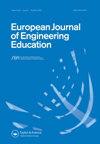‘Treading the no woman’s land’: the gender-STEM dynamics in higher education in premier institutions of India
IF 2.8
Q2 EDUCATION & EDUCATIONAL RESEARCH
引用次数: 1
Abstract
ABSTRACT The gender dimension of Science, Technology, Engineering and Mathematics (STEM) has intrigued social scientists for a long time. Although in India, women’s entry to STEM higher education has been improving over the last few decades, the reality of premier institutions remains broadly unaltered. The current qualitative research was an attempt: (a) to explore the career-selection-related decision-making, (b) to detect whether gendered processes are evident in STEM research laboratories, and (c) to explore the psychological effects of gendered processes among female doctoral/postdoctoral researchers. This qualitative study relied on in-depth interviews with twenty female STEM academics pursuing doctoral or postdoctoral research in ten premier Indian institutions. A hybrid of theoretical and inductive thematic analysis has been used to analyse the qualitative data. The results revealed that the combination of individual (interest and self-efficacy) and contextual factors (parental support and role models) had impacted the researchers’ decision to select and pursue higher studies in STEM. Furthermore, the current research shows that higher studies in STEM are characterised by the four defining features of gendering, i.e., gendered division of labour, gendered symbols, gendered identity, and gendered interactions (Acker, 1990). Gendering in STEM has led to self-doubt and diminished sense of belonging among the researchers.“踏上无人区”:印度顶尖院校高等教育中的性别STEM动态
科学、技术、工程和数学(STEM)的性别维度长期以来一直引起社会科学家的兴趣。尽管在过去的几十年里,印度女性接受STEM高等教育的机会一直在增加,但一流学府的现状基本上没有改变。目前的定性研究旨在:(a)探索与职业选择相关的决策,(b)检测性别过程在STEM研究实验室中是否明显,(c)探索性别过程对女性博士/博士后研究人员的心理影响。这项定性研究依赖于对20名在印度10个主要机构从事博士或博士后研究的女性STEM学者的深入访谈。对定性数据的分析采用了理论分析和归纳性专题分析相结合的方法。结果显示,个人(兴趣和自我效能)和环境因素(父母支持和榜样)的结合影响了研究人员选择和追求STEM高等研究的决定。此外,目前的研究表明,高等STEM研究具有性别化的四个特征,即性别分工、性别符号、性别认同和性别互动(Acker, 1990)。STEM领域的性别歧视导致了研究人员的自我怀疑和归属感的减弱。
本文章由计算机程序翻译,如有差异,请以英文原文为准。
求助全文
约1分钟内获得全文
求助全文
来源期刊

European Journal of Engineering Education
EDUCATION & EDUCATIONAL RESEARCH-
CiteScore
7.30
自引率
13.00%
发文量
64
期刊介绍:
European Journal of Engineering Education is published six times a year in print and electronic editions and provides an essential forum for dialogue between researchers and specialists in the field of engineering education, at European and worldwide levels. European Journal of Engineering Education is the Official Journal of SEFI, the Socièté Européenne pour la Formation des Ingénieurs (the European Society for Engineering Education). SEFI is a non-governmental organization whose aims are to develop information about engineering education, to improve communication and exchange between professors, researchers and students and to promote cooperation between the various institutions concerned with engineering education.
 求助内容:
求助内容: 应助结果提醒方式:
应助结果提醒方式:


